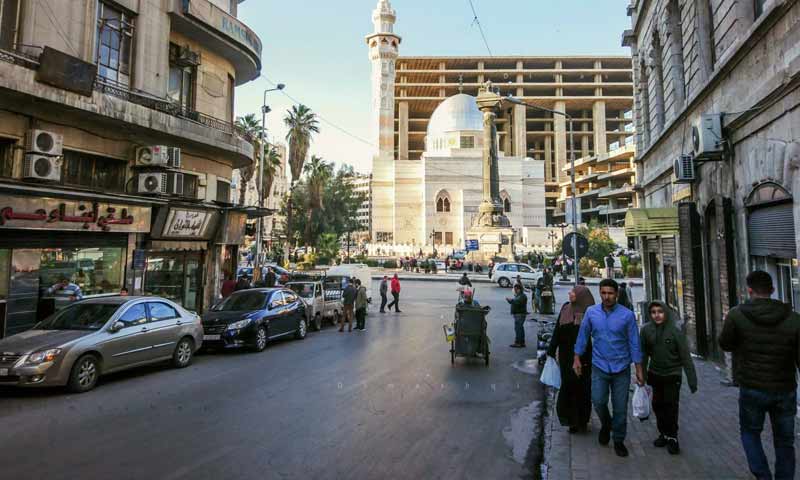



With her sad scattered words and letters, and with a stammering tongue, Abeer al-Qadir tells the story of her father’s suffering after being infected with the novel coronavirus (COVID-19).
“We looked everywhere in Damascus to ensure a bed for our father in a hospital, because he is in dire need of oxygen. But, we failed, and we had to buy a household oxygen cylinder for our father who left us early, while we are still keeping the cylinder in case one of us gets infected with the coronavirus.”
Abeer al-Qadir, a resident of Damascus, spoke to Enab Baladi about her father’s suffering after contracting the “coronavirus, which was not much different from the story of Suad al-Ghanim. Al-Ghanim spoke about her inability to reserve a room in Damascus hospitals, for her mother infected with the coronavirus.
Al-Ghanim told Enab Baladi that hospital rooms in the capital have become scarce, and the daily costs for patients receiving treatment in intensive care with a ventilator start from 250,000 Syrian pounds (SYP)and reach one million (One US dollar = approximately 2,000 SYP), “apart from the price of medicines.
The coronavirus is spreading like wildfire in Damascus, according to what has been confirmed by several residents of the capital whom Enab Baladi spoke to.
The suffering of Damascus residents has been exacerbated by high prices, monopoly and lack of medicines in pharmacies, shortages of medical supplies in hospitals, and the high costs of ventilators.
Ahmad Rafeh, a Syrian actor, spoke in an audio clip, that went viral on social media sites about the deteriorating health situation in hospitals in Syria after he was infected with the coronavirus, last July and took a COVID-10 swap test in al-Assad University Hospital.
Rafeh said, “Those infected with the coronavirus are lying on the ground at al-Assad University Hospital without care,” indicating that there are patients in dire need of oxygen, which is not available.
He described the situation of the COVID-19 patients as “depressing,” due to “lack of oxygen tankers, medicines, medical equipment,” explaining that many hospitals send their patients back home with a phone number, telling their families: “When the patient dies, tell us to take him.”
Minister of Health in the Syrian government, Nizar Yazigi said, on 8 August, that “375 additional oxygen delivery devices have been distributed to public hospitals, with measures taken to secure the safety of medical personnel.”
The government newspaper, Tishreen, published an investigation in which it said, “It is not surprising that the price of an oxygen cylinder reaches a million SYP, not 700 thousand SYP as predicted by some merchants. Everything is permissible in light of the absence of oversight bodies, the state of fear among citizens of the coronavirus, and the almost complete shortages of cylinders in warehouses.”
The price of an oxygen cylinder, if found, ranges from 225 to 300 thousand SYP according to its quality, while its price was between 25 and 50 thousand SYP before the “coronavirus” crisis.
With the absence and scarcity of oxygen cylinders and the rise in their prices, young Syrians in the capital Damascus launched the “Please Disinfect” initiative, which includes 166,000 members. The volunteers of the initiative provide their services to the needy while spreading advice on preventing the virus, taking preventive measures to avoid infection, and securing oxygen cylinders at nominal prices, The volunteers also provide a “free” home disinfection and sanitization services for those unable to pay.
Syrians who were unable to pay the treatment costs resorted to “self-medication by taking vitamins, and drinking more lemon, ginger, and fluids,” Layla, a resident of Damascus, told Enab Baladi.
However, the prices of lemon saw a sharp spike since the start of the COVID-19 outbreak, bringing the price of a kilo to five thousand SYP. This prompted some of them to “buy sour grapes,” Layla said.
Some citizens are afraid to disclose that they are COVID-19 patients and their families withhold the cause of death if it was caused by the coronavirus, for fear of the isolation of the building or the entire neighborhood, according to intersecting
Dr. Essam El-Amin, director of Mouwasat Hospital, said that the Syrian government tends to keep those infected with the “coronavirus” in their homes and receive severe cases only in hospitals.”
In an interview with the government newspaper, al-Baath, on 28 July, el-Amin said, “The only case accepted in the hospital is a patient with severe vision loss associated with acute respiratory failure and needs a ventilator. The number of these cases does not exceed three or four in all hospitals.” Plus, it is currently prevailing to keep the patient whose oxygen level is above 85 at home for treatment.”
He pointed out that “Most people have been infected with the COVID-19 since November or December 2019, and have built up the best immunity” and that doctors “limit symptoms in Syria to digestive and joint infections, indicating that fatal vision symptoms are rare.”
The number of confirmed cases related to COVID-19 in the regime-controlled areas, mostly in the governorates of Damascus and Rif Dimashq, reached 1,515, of which 403 cases have been cured, and 58 people have died, according to the data of the Syrian regime’s Ministry of Health.
But these numbers are met with skepticism by activists and doctors, who daily document dozens of COVID-19 cases and deaths.
if you think the article contain wrong information or you have additional details Send Correction